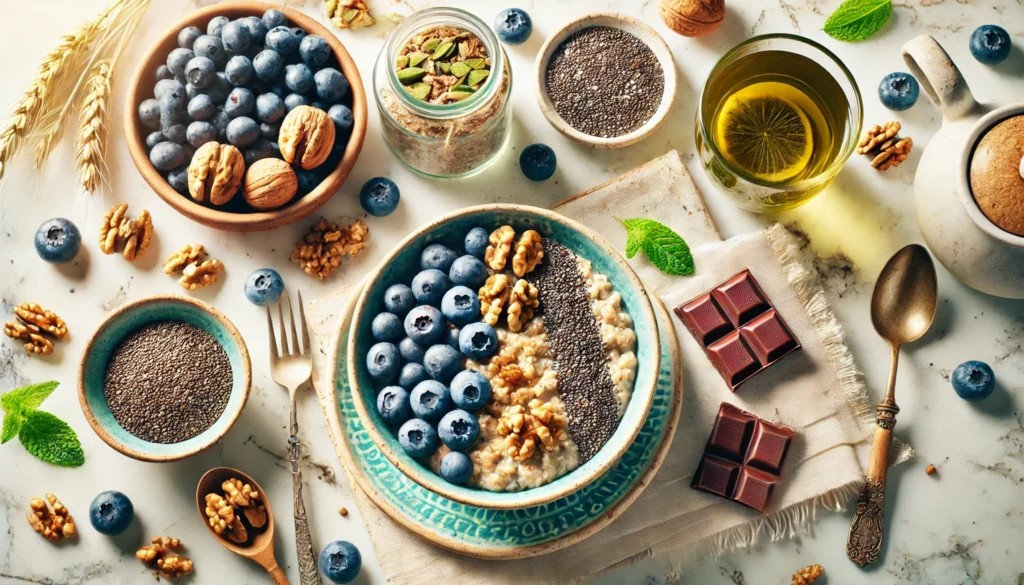The nervous system is the command center of the body, orchestrating everything from thoughts and emotions to movement and sensory experiences. To keep this intricate network functioning optimally, a balanced diet rich in specific nutrients is essential. Let’s delve into the top foods that can enhance your nervous system’s health, providing both scientific insights and practical advice.
You may also like: Top Foods to Enhance Your Memory
Understanding the Nervous System
Before we explore the foods that nourish the nervous system, it’s crucial to understand its complexity. The nervous system is divided into two main parts: the central nervous system (CNS), which includes the brain and spinal cord, and the peripheral nervous system (PNS), which comprises all the nerves branching out from the CNS.
The Central Nervous System: The Brain and Spinal Cord
The CNS is like the mainframe computer of the body, processing information and directing actions. The brain acts as the control center, managing everything from breathing and heartbeat to complex cognitive tasks. The spinal cord serves as a communication highway, transmitting messages between the brain and the rest of the body. This intricate network relies on a continuous supply of nutrients to maintain its function and efficiency.
The Peripheral Nervous System: Connecting the Dots
The PNS connects the CNS to limbs and organs, acting like a relay system. It ensures that signals from the brain reach distant parts of the body and that sensory information is sent back for processing. This system is divided further into the somatic nervous system, which controls voluntary movements, and the autonomic nervous system, which regulates involuntary functions like heartbeat and digestion.
Nutritional Needs of the Nervous System
The nervous system’s complex structure relies on a variety of nutrients to maintain its function. Vitamins, minerals, and other compounds play distinct roles in nerve signal transmission, myelin sheath integrity, and neurotransmitter synthesis. Ensuring a consistent supply of these nutrients is crucial for maintaining cognitive function and protecting against neurological disorders.
Omega-3 Fatty Acids: The Brain’s Best Friend
Omega-3 fatty acids are essential fats that the body cannot produce on its own, making their dietary intake crucial for brain health. They are known for their role in supporting cognitive functions and reducing inflammation.
Fatty Fish
Fatty fish such as salmon, mackerel, and sardines are rich sources of omega-3 fatty acids, particularly eicosapentaenoic acid (EPA) and docosahexaenoic acid (DHA). These essential fats are integral for maintaining the structural integrity of brain cells and facilitating communication between neurons. Studies suggest that regular consumption of omega-3-rich fish may enhance cognitive function and protect against neurodegenerative diseases.
Eating fatty fish at least twice a week can ensure adequate intake of these beneficial fats. Cooking methods such as grilling or baking help preserve their nutrient content. For those who do not consume fish, omega-3 supplements derived from algae offer an excellent alternative, providing similar benefits.
Walnuts
Walnuts are another excellent source of alpha-linolenic acid (ALA), a plant-based omega-3 fatty acid. They also contain polyphenolic compounds that have antioxidant properties, protecting the brain from oxidative stress and inflammation. Incorporating a handful of walnuts into your daily diet can contribute to improved brain health and function.
Walnuts can be added to salads, oatmeal, or simply eaten as a snack. Their versatility makes them easy to include in various dishes, enhancing both flavor and nutritional value. Regular consumption can aid in the maintenance of cognitive functions and overall brain health.
Chia Seeds and Flaxseeds
Chia seeds and flaxseeds are plant-based powerhouses of ALA. These seeds are not only rich in omega-3s but also provide fiber and protein, making them a nutritious addition to any diet. They can be sprinkled over yogurt, added to smoothies, or used in baking to increase omega-3 intake.
Incorporating these seeds into your daily meals can help support heart and brain health. Their mild flavor and small size make them a convenient option for boosting nutritional content without altering taste significantly.

B Vitamins: The Nervous System’s Energizers
B vitamins are a group of nutrients that play crucial roles in maintaining nerve health and energy production. Each B vitamin has specific functions that contribute to the overall health of the nervous system.
Whole Grains
Whole grains like oats, brown rice, and quinoa are rich in B vitamins, particularly thiamine, riboflavin, and niacin. These vitamins are vital for energy production and neurotransmitter synthesis, which are crucial for proper nervous system function. A diet that includes whole grains can help maintain high energy levels and support cognitive processes.
Whole grains provide a sustained release of energy, helping to keep blood sugar levels stable. This steadiness is essential for optimal brain function and mood regulation. Incorporating whole grains into your diet can also aid digestion and promote overall health.
Leafy Greens
Leafy greens such as spinach, kale, and Swiss chard are packed with folate (vitamin B9), which plays a crucial role in the production of neurotransmitters like serotonin and dopamine. These chemicals are essential for mood regulation and cognitive function. Including a variety of leafy greens in your meals can help boost your mood and cognitive performance.
Leafy greens are versatile and can be used in salads, smoothies, or as a side dish. Their high nutrient density makes them an excellent choice for anyone looking to enhance their diet. Regular consumption of leafy greens can also reduce the risk of chronic diseases and improve overall health.
Legumes
Legumes, such as lentils, chickpeas, and beans, are excellent sources of B vitamins, particularly folate, and vitamin B6. These nutrients are vital for brain health and the production of neurotransmitters. Including legumes in your diet can provide a significant boost to your nervous system.
Legumes are highly versatile and can be used in soups, stews, salads, and more. They are an affordable and nutritious way to enhance your intake of essential vitamins. Their high protein and fiber content also support digestion and satiety.
Antioxidants: Defenders Against Oxidative Stress
Antioxidants play a crucial role in defending the nervous system against oxidative stress, which can lead to cellular damage. By neutralizing free radicals, antioxidants help maintain brain health and cognitive function.
Berries
Berries, especially blueberries, are renowned for their high antioxidant content. These antioxidants, particularly flavonoids, help reduce oxidative stress and inflammation in the brain, supporting memory and learning. Regular consumption of berries can contribute to long-term brain health.
Berries can be enjoyed fresh, frozen, or dried, making them a convenient option year-round. They can be added to cereals, yogurt, or eaten as a snack. Their vibrant colors and sweet flavors make them a delightful addition to any meal.
Dark Chocolate
Dark chocolate with a high cocoa content is another potent source of antioxidants, specifically flavonoids. These compounds enhance blood flow to the brain, improving cognitive function and mood. Enjoying a small piece of dark chocolate can be a delightful way to support your nervous system.
Choosing dark chocolate with at least 70% cocoa content ensures a higher concentration of antioxidants. Moderation is key, as chocolate is calorie-dense. Including it in your diet as an occasional treat can provide both pleasure and health benefits.
Green Tea
Green tea is rich in polyphenols, which are powerful antioxidants that protect the brain from oxidative stress. Drinking green tea regularly can improve brain function and reduce the risk of neurodegenerative diseases. It is a refreshing and healthful beverage choice.
Green tea can be enjoyed hot or cold and is available in various forms, including loose leaf, bags, and matcha powder. Its subtle flavor pairs well with a variety of foods, making it a versatile beverage option.
Magnesium: The Calming Mineral
Magnesium is a vital mineral that supports many bodily functions, including nerve transmission and muscle function. It also plays a role in regulating neurotransmitter release, contributing to a sense of calm and relaxation.
Avocado
Avocados are rich in magnesium, a mineral that plays a critical role in nerve transmission and muscle function. Magnesium also helps regulate neurotransmitter release, contributing to a sense of calm and relaxation. Incorporating avocados into your diet can help reduce stress and anxiety, promoting overall nervous system health.
Avocados can be added to salads, smoothies, or enjoyed on toast. Their creamy texture and mild flavor make them a versatile ingredient in many dishes. Regular consumption of avocados can support heart health and improve digestion.
Almonds
Almonds are another excellent source of magnesium, along with vitamin E and healthy fats. These nutrients work synergistically to support brain health and enhance memory. Snacking on almonds can be a convenient way to boost your magnesium intake and support your nervous system.
Almonds can be eaten raw, roasted, or as almond butter. They make a satisfying snack and can be added to various dishes for added crunch and flavor. Regularly including almonds in your diet can aid in weight management and improve heart health.
Pumpkin Seeds
Pumpkin seeds are packed with magnesium, zinc, and antioxidants, making them a superfood for brain health. These seeds support nerve function and help maintain a relaxed state. Including pumpkin seeds in your diet can enhance your magnesium intake.
Pumpkin seeds can be sprinkled over salads, added to trail mix, or enjoyed on their own. Their nutty flavor adds depth to both sweet and savory dishes. Regular consumption can boost immune function and support overall health.
The Future of Nervous System Nutrition
As research continues to unveil the intricate relationship between diet and the nervous system, the future looks promising for developing targeted nutritional strategies to support brain health. Emerging studies on nootropics and bioactive compounds in foods offer exciting possibilities for enhancing cognitive function and protecting against neurological disorders.
Advances in Nutritional Neuroscience
Research in nutritional neuroscience is rapidly advancing, revealing new insights into how specific nutrients impact brain function. Scientists are exploring the potential of nootropics, natural or synthetic substances that may improve cognitive function. These studies aim to develop dietary interventions that can support mental performance and delay cognitive decline.

Personalized Nutrition for Brain Health
Personalized nutrition is an emerging field that tailors dietary recommendations to individual needs based on genetic, biochemical, and lifestyle factors. This approach holds promise for optimizing brain health by identifying specific nutrients that can enhance cognitive function and protect against neurological diseases.
The Role of Gut Health in Brain Function
Recent research highlights the connection between gut health and brain function, often referred to as the gut-brain axis. A healthy gut microbiome can positively influence mood and cognition. Future nutritional strategies may focus on supporting gut health to enhance nervous system function.
Incorporating a variety of these nutrient-rich foods into your diet can significantly impact your nervous system’s health. By doing so, you support not only brain function but also overall well-being. As new discoveries emerge, staying informed and adapting your dietary choices can help optimize your nervous system’s performance.
Practical Tips for Incorporating Nervous System-Boosting Foods
Incorporating nervous system-boosting foods into your daily routine doesn’t have to be complicated. With a few simple adjustments, you can enhance your diet and support your nervous system’s health.
Start Your Day with a Nutritious Breakfast
Incorporate whole grains and a serving of berries to kickstart your morning with essential nutrients for brain health. Opt for oatmeal topped with fresh berries or a smoothie with spinach and chia seeds. These choices provide a powerful combination of B vitamins, antioxidants, and omega-3s to fuel your day.
Snack Smartly
Choose snacks like walnuts or almonds to provide sustained energy and support cognitive function throughout the day. These snacks are easy to carry and make for a healthy alternative to processed options. Pair them with a piece of fruit for added fiber and nutrients.
Include Fatty Fish Weekly
Aim to include fatty fish like salmon or sardines in your meals at least twice a week to benefit from omega-3 fatty acids. Grilled or baked fish can be paired with whole grains and vegetables for a balanced meal. For a quick option, canned sardines can be added to salads or sandwiches.
Embrace Variety
Incorporate a range of colorful fruits and vegetables to ensure a diverse intake of antioxidants and vitamins. Each color represents different phytonutrients that benefit health. Try to include a rainbow of produce in your meals to maximize nutritional benefits.
Experiment with Dark Chocolate
Enjoy a small piece of dark chocolate as an occasional treat to boost mood and cognitive function. Look for chocolate with high cocoa content for the best health benefits. Savor it mindfully to fully appreciate its rich flavor and potential health perks.
By making these simple adjustments to your diet, you can harness the power of nutrition to support your nervous system and enhance your overall health.

Conclusion
In conclusion, a diet rich in omega-3 fatty acids, B vitamins, antioxidants, and magnesium can significantly impact the health and function of your nervous system. By understanding the nutrients essential for neural health, you can make informed dietary choices that promote cognitive function and protect against neurological decline. Embrace these foods as part of a balanced diet, and your nervous system will thank you for it. Staying informed about the latest research and adapting your diet accordingly can help ensure optimal brain health and overall well-being.
Further Reading:
Eating to Promote a Healthy Nervous System
Essential Foods and Stress-Busting Techniques
Important Note: The information contained in this article is for general informational purposes only, and should not be construed as health or medical advice, nor is it intended to diagnose, prevent, treat, or cure any disease or health condition. Before embarking on any diet, fitness regimen, or program of nutritional supplementation, it is advisable to consult your healthcare professional in order to determine its safety and probable efficacy in terms of your individual state of health.
Regarding Nutritional Supplements Or Other Non-Prescription Health Products: If any nutritional supplements or other non-prescription health products are mentioned in the foregoing article, any claims or statements made about them have not been evaluated by the U.S. Food and Drug Administration, and such nutritional supplements or other health products are not intended to diagnose, treat, cure, or prevent any disease.


